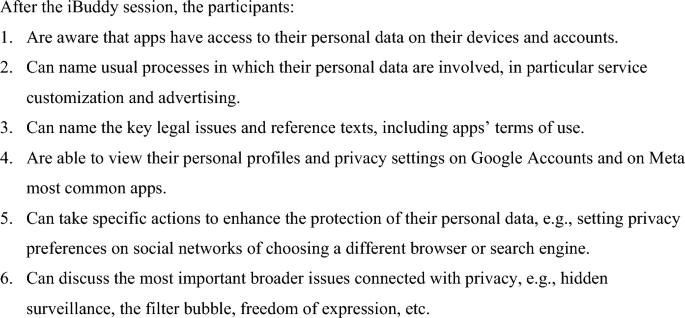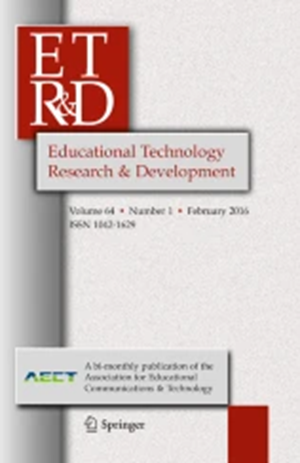The iBuddy experience: A digital simulation-based approach to enhance secondary school students’ privacy awareness
IF 4.2
3区 教育学
Q1 EDUCATION & EDUCATIONAL RESEARCH
Etr&d-Educational Technology Research and Development
Pub Date : 2023-11-06
DOI:10.1007/s11423-023-10309-x
引用次数: 0
Abstract
Abstract Privacy is a central issue in the digitalization of society and directly concerns all Internet users. Privacy education is part of the picture of a more just digital society: it aims at making users more aware of the importance of their data and of the technical and financial tools and processes that involve their personal data. Nonetheless, privacy education is confronted with a paradox: while people perceive the importance of privacy, they seldom take action to actually protect their personal data. iBuddy is a narrative simulation-based session inspired by research evidence about the privacy paradox and aims to (a) enhancing awareness and (b) promoting the uptake of privacy-safe behaviors for secondary and higher students (age range 11–20). The paper presents the design and development of the simulation and of the following modular debriefing, as a case study in evidence-based collaborative instructional design and in the instructional used of digital technology. The evaluation of iBuddy, which combined a post-session satisfaction and perceived learning survey ( N = 978) and a follow-up survey ( N = 124), provides insights in the novel domain of privacy education. Results suggests that iBuddy sessions are engaging, effective and conducive to medium-term behavioral change, thus indirectly confirming the design assumptions about how to tackle the privacy paradox through a simulation-based approach.

iBuddy体验:以数码模拟方式提升中学生的私隐意识
隐私问题是数字化社会的核心问题,直接关系到所有互联网用户。隐私教育是更公正的数字社会图景的一部分:它旨在让用户更加意识到他们的数据的重要性,以及涉及他们个人数据的技术和财务工具和流程。然而,隐私教育面临着一个悖论:虽然人们意识到隐私的重要性,但他们很少采取行动来实际保护他们的个人数据。iBuddy是一个基于叙述模拟的会议,灵感来自于关于隐私悖论的研究证据,旨在(a)提高意识,(b)促进中学生和高中生(11-20岁)对隐私安全行为的吸收。本文介绍了模拟的设计和开发以及以下模块汇报,作为基于证据的协作教学设计和数字技术教学应用的案例研究。对iBuddy的评估结合了会话后满意度和感知学习调查(N = 978)和后续调查(N = 124),为隐私教育的新领域提供了见解。结果表明,iBuddy会话具有吸引力、有效性,有利于中期行为改变,从而间接证实了如何通过基于模拟的方法解决隐私悖论的设计假设。
本文章由计算机程序翻译,如有差异,请以英文原文为准。
求助全文
约1分钟内获得全文
求助全文
来源期刊

Etr&d-Educational Technology Research and Development
EDUCATION & EDUCATIONAL RESEARCH-
CiteScore
10.70
自引率
4.00%
发文量
94
期刊介绍:
Educational Technology Research and Development is the only scholarly journal in the field focusing entirely on research and development in educational technology.
The Research Section assigns highest priority in reviewing manuscripts to rigorous original quantitative, qualitative, or mixed methods studies on topics relating to applications of technology or instructional design in educational settings. Such contexts include K-12, higher education, and adult learning (e.g., in corporate training settings). Analytical papers that evaluate important research issues related to educational technology research and reviews of the literature on similar topics are also published. This section features well-documented articles on the practical aspects of research as well as applied theory in educational practice and provides a comprehensive source of current research information in instructional technology.
The Development Section publishes research on planning, implementation, evaluation and management of a variety of instructional technologies and learning environments. Empirically based formative evaluations and theoretically based instructional design research papers are welcome, as are papers that report outcomes of innovative approaches in applying technology to instructional development. Papers for the Development section may involve a variety of research methods and should focus on one aspect of the instructional development process or more; when relevant and possible, papers should discuss the implications of instructional design decisions and provide evidence linking outcomes to those decisions.
The Cultural and Regional Perspectives Section (formerly International Review) welcome s innovative research about how technologies are being used to enhance learning, instruction, and performance specific to a culture or region. Educational technology studies submitted to this section should be situated in cultural contexts that critically examine issues and ideologies prevalent in the culture or region or by individuals or groups in the culture or region. Theoretical perspectives can be broadly based and inclusive of research, such as critical race theory, cultural-historical activity theory, and cultural models. Papers published in this section include quantitative, qualitative, and mixed-methods articles and reviews drawing on relevant theories, empirical evidence, and critical analyses of the findings, implications, and conclusions within a cultural context.
Educational Technology Research and Development publishes special issues on timely topics of interest to the community, in addition to regular papers.
 求助内容:
求助内容: 应助结果提醒方式:
应助结果提醒方式:


